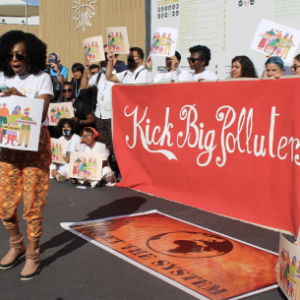In the opening days of the U.N. climate talks, dozens of activists gathered and sang “All we are saying…is kick polluters out!” to the tune of “Give Peace a Chance” as delegates entered the meeting space.
It was a powerful moment and a testament to just how far this call has come. And it was thanks to your support! Now, as the talks conclude, we wanted to tell you about some of the key takeaways from the talks, and share how you are a critical part of this growing movement.
In the first few years of Corporate Accountability’s climate campaign, we were laser-focused on organizing with a handful of allies to keep Big Polluters from having a seat at the policy-making table.
Now, just a few short years later, kicking Big Polluters out of the talks was one of the main rallying cries of civil society. Over 450 organizations signed on to a set of demands to Kick Big Polluters Out (check out all the organizations, and the demands at www.KickBigPollutersOut.org). And a UNFCCC coalition representing thousands of organizations around the world from various constituency groups (like women, young people, and trade unions) officially proposed the strongest-ever position on conflicts of interest to the U.N. body governing the climate talks.
And to demonstrate the extent of the problem with Big Polluters attending the climate talks, when the U.N. released the list of people who registered to attend COP27, we and our allies at Global Witness and Corporate Europe Observatory quickly analyzed the list and found 636 lobbyists tied to the fossil fuel industry had registered. That’s more than any single country’s delegation to the talks (except for the UAE). And that’s over 100 more lobbyists than attended last year’s talks. The BBC then exposed just how widespread Big Polluters’ influence at the climate talks continues to be. The news was then picked up in media outlets around the world, from Reuters and the AP to the Washington Post and PBS.
Of course, that is just a small piece of what went on at the climate talks. There were fierce negotiations about a slew of issues, like whether wealthy Global North countries that have historically contributed the most to global emissions (like the U.S.) should support and compensate Global South countries and frontline communities for losses and damages incurred because of the climate crisis. More than 20,000 activists from Corporate Accountability and a coalition of allies signed a petition that was delivered to the U.S. delegation demanding that negotiators stop standing in the way of a finance mechanism to help Global South and front-line communities dealing with climate impacts. This lent solidarity to the climate justice movement’s organizing to demand this fund. And, despite U.S. obstruction, COP27 ended in a historic agreement that heeded the people’s demands and agreed to establish a Loss and Damage fund.
Though there were some major victories, there were also some major failures. COP27 failed to acknowledge the need to justly phase out fossil fuels, and so failed to address the root cause of the crisis. This outcome isn’t surprising, given that Big Polluters are still allowed to roam the halls of the climate talks. Until they are kicked out, climate action will never fully deliver what we need to justly address the climate crisis.
None of this would have been possible without your support. Going up against some of the most powerful corporate interests in the world is daunting. But we can do it because of the thousands of people like you who donate, take action, and add your voice to this movement. The power we are building together means we can make real progress on addressing the climate crisis without Big Polluters pushing dangerous distractions, or delaying and derailing policies to protect their own profits.
While this round of climate talks has come to a close, we’ve got plans to keep building this movement and I hope you’ll continue to organize with us in the coming months and years.



